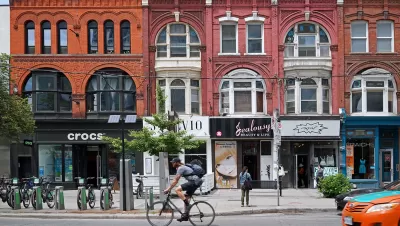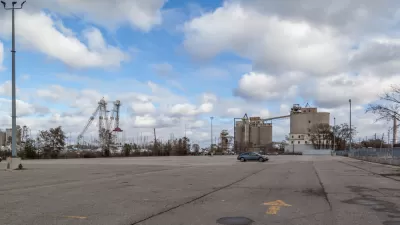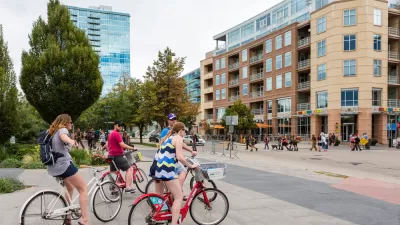A study published recently in the Journal of the American Planning Association finds that mixed-use neighborhoods in Toronto are only delivering benefits to those who can afford to pay a premium.

"A new study by a School of Planning researcher at University of Waterloo shows mixed-use development might be increasing income inequality," according to an article on the CBC News website.
"Data collected between 1991 and 2006 in Toronto showed that housing options in mixed-use zones — those mixing residential and commercial properties — continued to be less affordable than housing in other parts of the city," adds the article.
The researcher is Markus Moos, and he provides several quotes in a press release announcing the new study to explain the implications of the findings: "Walking to a nearby fancy coffee shop is nice but the premium people pay for that luxury means the barista can't afford to live near their job."
The press release and the article both present ideas for how mixed-use neighborhoods can better deliver benefits across the economic spectrum. The press release especially makes it clear that mixed-use neighborhoods are not "inherently misguided."
"What’s needed now is good policy to follow good planning," says Tara Vinodrai, a professor at Waterloo’s Department of Geography and Environmental Management in the press release. "This includes inclusionary zoning, density bonuses linked to affordable housing, affordable housing trusts, and other relevant methods."
FULL STORY: Mixed-use developments make housing more expensive, says study

Trump Administration Could Effectively End Housing Voucher Program
Federal officials are eyeing major cuts to the Section 8 program that helps millions of low-income households pay rent.

Planetizen Federal Action Tracker
A weekly monitor of how Trump’s orders and actions are impacting planners and planning in America.

Ken Jennings Launches Transit Web Series
The Jeopardy champ wants you to ride public transit.

Crime Continues to Drop on Philly, San Francisco Transit Systems
SEPTA and BART both saw significant declines in violent crime in the first quarter of 2025.

How South LA Green Spaces Power Community Health and Hope
Green spaces like South L.A. Wetlands Park are helping South Los Angeles residents promote healthy lifestyles, build community, and advocate for improvements that reflect local needs in historically underserved neighborhoods.

Sacramento Plans ‘Quick-Build’ Road Safety Projects
The city wants to accelerate small-scale safety improvements that use low-cost equipment to make an impact at dangerous intersections.
Urban Design for Planners 1: Software Tools
This six-course series explores essential urban design concepts using open source software and equips planners with the tools they need to participate fully in the urban design process.
Planning for Universal Design
Learn the tools for implementing Universal Design in planning regulations.
Heyer Gruel & Associates PA
Ada County Highway District
Institute for Housing and Urban Development Studies (IHS)
City of Grandview
Harvard GSD Executive Education
Toledo-Lucas County Plan Commissions
Salt Lake City
NYU Wagner Graduate School of Public Service





























